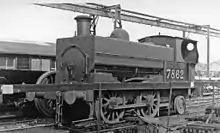| LNWR 317 class 4′ 3″ Saddle Tank Shunter | |||||||||||||||||||||||||||||||||||||
|---|---|---|---|---|---|---|---|---|---|---|---|---|---|---|---|---|---|---|---|---|---|---|---|---|---|---|---|---|---|---|---|---|---|---|---|---|---|
 Locomotive 317, Crewe Works No.3464 | |||||||||||||||||||||||||||||||||||||
| |||||||||||||||||||||||||||||||||||||
| |||||||||||||||||||||||||||||||||||||
| |||||||||||||||||||||||||||||||||||||
The LNWR 317 class, (also known as Saddle Tank Shunter, Dock Tank or Bissel Tank) consisted of a class of 20 square saddle-tanked steam locomotives built by the London and North Western Railway at their Crewe Works between 1896 and 1901. They had a very short coupled wheelbase, with a trailing Bissel truck to carry weight.
History
They were built in three batches of 1, 9 and 10; their first running number was chosen at random from the numbers left vacant by locomotives that had been transferred to the duplicate list. This fate was almost immediately suffered by the 317 class – after only one or two months in service.[1]
All passed to the London, Midland and Scottish Railway in 1923, who initially allocated them the numbers 6400–6419 in the passenger tank sequence. Only five (6402/03/07/14/18) had been renumbered before the numbers were changed to 7850–7869 in 1927, thus moving them into the goods and shunting tanks. The LMS changed their power classification from 1P[2] to 0F at the same time.
Two, 7862 and 7865, survived to enter British Railways service in 1948; 7865 was withdrawn in November 1953, and 7862 three years later. None were preserved.

Fleet
| First LNWR No. | Crewe Works no. | Build date | Duplicate LNWR No. | Date duplicated | 1st LMS No. | 2nd LMS No. | Date withdrawn | Notes |
|---|---|---|---|---|---|---|---|---|
| 317 | 3741 | Nov 1896 | 3464 | Oct 1899 | 6400 | 7850 | Nov 1930 | |
| 19 | 3976 | Nov 1899 | 3465 | Dec 1899 | 6401 | 7851 | Nov 1932 | |
| 22 | 3977 | Nov 1899 | 3466 | Dec 1899 | 6402 | 7852 | Nov 1927 | |
| 25 | 3978 | Nov 1899 | 3467 | Dec 1899 | 6403 | 7853 | Aug 1932 | |
| 26 | 3979 | Nov 1899 | 3468 | Dec 1899 | 6404 | 7854 | Dec 1930 | |
| 38 | 3980 | Nov 1899 | 3469 | Dec 1899 | 6405 | 7855 | Jul 1936 | |
| 39 | 3981 | Nov 1899 | 3470 | Dec 1899 | 6406 | 7856 | Dec 1929 | |
| 47 | 3982 | Nov 1899 | 3471 | Dec 1899 | 6407 | 7857 | Nov 1929 | |
| 49 | 3983 | Nov 1899 | 3472 | Dec 1899 | 6408 | 7858 | Dec 1936 | |
| 51 | 3984 | Nov 1899 | 3473 | Dec 1899 | 6409 | 7859 | Jun 1938 | |
| 813 | 4175 | Oct 1901 | 3524 | Dec 1901 | 6410 | 7860 | Dec 1929 | |
| 815 | 4176 | Oct 1901 | 3525 | Dec 1901 | 6411 | 7861 | Dec 1932 | |
| 823 | 4177 | Nov 1901 | 3526 | Dec 1901 | 6412 | 7862 | Nov 1956 | |
| 826 | 4178 | Nov 1901 | 3527 | Dec 1901 | 6413 | 7863 | Nov 1931 | |
| 843 | 4179 | Nov 1901 | 3528 | Dec 1901 | 6414 | 7864 | Nov 1929 | |
| 859 | 4180 | Nov 1901 | 3529 | Jan 1902 | 6415 | 7865 | Nov 1953 | |
| 898 | 4181 | Nov 1901 | 3530 | Jan 1902 | 6416 | 7866 | Oct 1931 | |
| 899 | 4182 | Nov 1901 | 3531 | Jan 1902 | 6417 | 7867 | Jun 1932 | |
| 904 | 4183 | Nov 1901 | 3532 | Jan 1902 | 6418 | 7868 | Nov 1929 | |
| 905 | 4184 | Nov 1901 | 3533 | Jan 1902 | 6419 | 7869 | Nov 1932 | |
References
- 1 2 Baxter 1979, p. 214.
- ↑ Casserley & Johnston 1974, p. 71.
- Baxter, Bertram (1979). Baxter, David (ed.). British Locomotive Catalogue 1825–1923, Volume 2B: London and North Western Railway and its constituent companies. Ashbourne, Derbyshire: Moorland Publishing Company. p. 214. ISBN 0-903485-84-2.
- Casserley, H. C. & Johnston, Stuart W. (1974) [1966]. Locomotives at the Grouping 3: London, Midland and Scottish Railway. Shepperton, Surrey: Ian Allan. p. 71. ISBN 0-7110-0554-0.